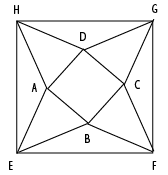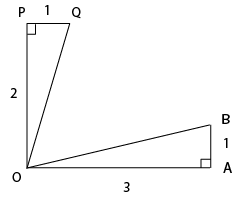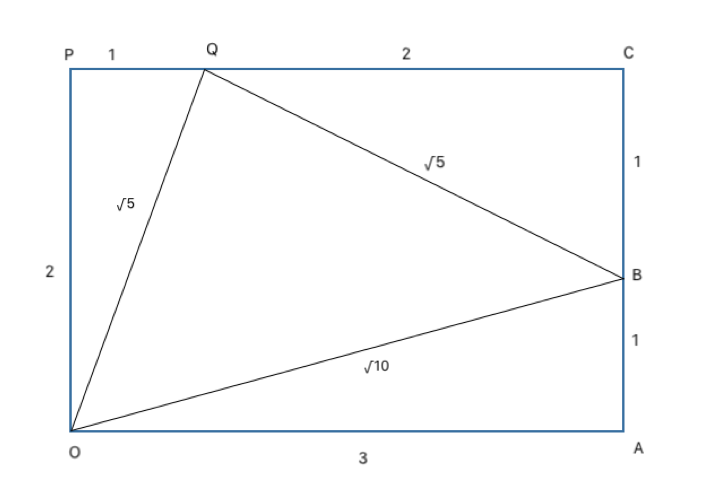XAT 2019 Question Paper
For the following questions answer them individually
XAT 2019 - Question 61
In the picture below, EFGH, ABCD are squares, and ABE, BCF, CDG, DAH are equilateral triangles. What is the ratio of the area of the square EFGH to that of ABCD?

XAT 2019 - Question 62
What is the maximum number of points that can be placed on a circular disk of radius 1 metre (some of the points could be placed on the bounding circle of the disk) such that no two points are at a distance of less than 1 metre from each other?
XAT 2019 - Question 63
The figure below shows two right angled triangles ∆OAB and ∆OQP with right angles at vertex A and P, respectively, having the common vertex O, The lengths of some of the sides are indicated in the figure. (Note that the figure is not drawn to scale.) AB and OP are parallel.
What is ∠QOB?

XAT 2019 - Question 64
Consider the function f(x) = (x + 4)(x + 6)(x + 8) ⋯ (x + 98). The number of integers x for which f(x) < 0 is:
XAT 2019 - Question 65
Let ABC be an isosceles triangle. Suppose that the sides AB and AC are equal and let the length of AB be x cm. Let b denote the angle ∠ABC and sin b = 3/5. If the area of the triangle ABC is M square cm, then which of the following is true about M?
XAT 2019 - Question 66
If $$x^2 + x + 1 = 0$$, then $$x^{2018} + x^{2019}$$ equals which of the following:
XAT 2019 - Question 67
We have two unknown positive integers m and n, whose product is less than 100.
There are two additional statement of facts available:
mn is divisible by six consecutive integers { j, j + 1,...,j + 5 }
m + n is a perfect square.
Which of the two statements above, alone or in combination shall be sufficient to determine the numbers m and n?
XAT 2019 - Question 68
A bag contains marbles of three colours-red, blue and green. There are 8 blue marbles in the bag.
There are two additional statement of facts available:
If we pull out marbles from the bag at random, to guarantee that we have at least 3 green marbles, we need to extract 17 marbles.
If we pull out marbles from the bag at random, to guarantee that we have at least 2 red marbles, we need to extract 19 marbles.
Which of the two statements above, alone or in combination shall be sufficient to answer the question "how many green marbles are there in the bag"?
The break-up of the students in a university by subject major is given in the polar pie-chart. The bar chart shows the number of students who major in physics by geographic location.


XAT 2019 - Question 70
If the proportion of physics majors who are from Delhi is the same as the proportion of engineering majors who are from Delhi, how many engineering majors are from Delhi?





.webp)

